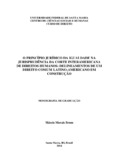| dc.contributor.advisor | Saldanha, Jânia Maria Lopes | |
| dc.creator | Brum, Márcio Morais | |
| dc.date.accessioned | 2017-08-21T17:02:32Z | |
| dc.date.available | 2017-08-21T17:02:32Z | |
| dc.date.issued | 2014-11-28 | |
| dc.date.submitted | 2014 | |
| dc.identifier.uri | http://repositorio.ufsm.br/handle/1/11464 | |
| dc.description | Trabalho de conclusão de curso (graduação) - Universidade Federal de Santa Maria, Centro de Ciências Sociais e Humanas, Curso de Direito, RS, 2014. | por |
| dc.description.abstract | This work aims to study the position of Inter-American Court of Human Rights about the principle of equality and non-discrimination, verifying if any changes of interpretation had happened during the last decades and discuss in what way the Court´s jurisprudence influence the nationals Latin-American jurisdictions and governments, advancing the process of internationalization of Law and the building of a Latin-American reciprocal Law on human rights. The research finds three justifications: the reality of distinguished structural of the States in the zone; the function of Law in protecting the democratic achievements and precluding civilizational throwbacks; and the relevance of international Law in this process. The research applied the dialectic's approach method, once the investigation has as object the processes of juridical integration happening in the zone marked by the conflictual relation between the existent normative multiplicities. The results shows that the Court's jurisprudence always expressed a material conception of equality, understood as equal possibility of fruiting the fundamental rights. However, in the cases related to social rights of migrant‟s workers with no documents, there was no extensive interpretation in order of an ideal of social justice distributive, governed by a social-economic criterion. Thus, the research concludes that there is an unfinished affirmation process of a Latin-American reciprocal Law, based in a substantial conception of equality, from what emerges to the States the duty to figure out the inequalities in the internal structures. | eng |
| dc.language | por | por |
| dc.publisher | Universidade Federal de Santa Maria | por |
| dc.rights | Acesso Aberto | por |
| dc.subject | Corte interamericana | por |
| dc.subject | Princípio da igualdade | por |
| dc.subject | Direito comum | por |
| dc.subject | Inter-american court | eng |
| dc.subject | Reciprocal law | eng |
| dc.title | O princípio jurídico da igualdade na jurisprudência da Corte Interamericana de Direitos Humanos: delineamentos de um direito comum latino-americano em construção | por |
| dc.title.alternative | The legal principle of equality in the jurisprudence of inter-american court of human rights: designs of a latin-american reciprocal law on building | eng |
| dc.type | Trabalho de Conclusão de Curso de Graduação | por |
| dc.degree.local | Santa Maria, RS, Brasil | por |
| dc.degree.graduation | Direito | por |
| dc.description.resumo | O trabalho tem por objetivo central estudar o entendimento da Corte Interamericana de
Direitos Humanos sobre o princípio da igualdade e não discriminação, verificar se houve
mudanças interpretativas ao longo das últimas décadas e examinar de que forma sua
jurisprudência influencia nas jurisdições e governos nacionais latino-americanos, fazendo
avançar o processo de internacionalização do direito e construção de um direito comum
latino-americano dos direitos humanos. A pesquisa se justifica por três principais razões: pela
realidade da desigualdade estrutural presente na região; pelo papel do direito na proteção de
conquistas democráticas e impedimento de retrocessos civilizacionais; e pela importância do
direito internacional neste processo. A pesquisa empregou o método de abordagem dialético,
vez que a investigação teve como objeto processos de integração jurídica em curso na região,
caracterizados pela relação conflituosa entre a multiplicidade normativa existente. Descobriuse
que a jurisprudência do Tribunal sempre expressou uma concepção material de igualdade,
entendida como igual possibilidade de gozo dos direitos fundamentais. Nos casos
relacionados a direitos sociais de trabalhadores migrantes indocumentados, todavia, não há
alargamento interpretativo para um ideal de justiça social distributiva, orientada pelo critério
socioeconômico. Diante disso, concluiu-se haver um processo inacabado de afirmação de um
direito comum latino-americano, assentado em uma concepção substancial de igualdade, da
qual deriva aos Estados o dever de solucionar as desigualdades estruturais internas. | por |
| dc.publisher.country | Brasil | por |
| dc.publisher.initials | UFSM | por |
| dc.subject.cnpq | CNPQ::CIENCIAS SOCIAIS APLICADAS::DIREITO | por |
| dc.publisher.unidade | Centro de Ciências Sociais e Humanas | por |


